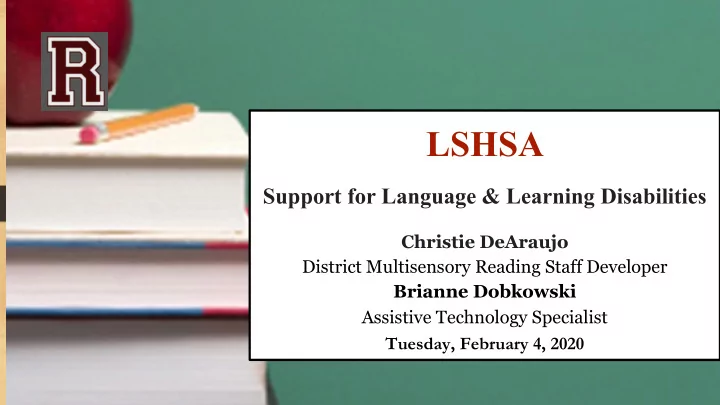

LSHSA Support for Language & Learning Disabilities Christie DeAraujo District Multisensory Reading Staff Developer Brianne Dobkowski Assistive Technology Specialist Tuesday, February 4, 2020
Vision 2019-2020: To model dignity and empathy while providing support to students with special needs in recognizing and using their abilities, skills, and strengths to foster independence and success as life-long learners and productive members of an inclusive community.
SLD Specific Learning Disabilities (SLD) When provided with appropriate learning opportunities, children with & specific learning disabilities do not achieve commensurate with age and LLD ability level in one or more of the following areas: (1) Basic reading skills; (2) Reading comprehension; (3) Oral expression; (4) Listening comprehension; (5) Mathematical calculation; (6) Mathematical problem solving; (7) Written expression; and (8) Reading fluency. Language & Learning Disabilities (LLD) A language learning disability is a disorder that may affect the comprehension and use of spoken or written language as well as nonverbal language , such as eye contact and tone of speech, in both adults and children.
LLD & Language & Learning Disabilities (LLD) & Dyslexia Dyslexia According to the National Institute of Health, at least 15% of the population has some type of learning disability . The most common type of learning disability is a language learning disability ( LLD ), which encompasses disorders of reading, writing, and spelling. Dyslexia is a common language - based learning disability . Dyslexia can affect reading fluency, decoding, reading comprehension, recall, writing, spelling, and sometimes speech and can exist along with other related disorders. The greatest difficult those with the disorder have is with spoken and the written word.
Early Literacy Development Students with language-based learning disabilities may struggle academically because of weak language skills which can impede comprehension and communication. These students may benefit from early literacy strategies that are based in multisensory techniques.
Christie DeAraujo District Multisensory Reading Staff Developer Other Key MSR Support Personnel: • Brianne Dobkowski - Assistive Technology Specialist • LDT-Cs • MSR Instructors • Special Education Teachers • Education Specialists
What is Multisensory Reading? ● Multisensory Reading is an instructional approach to teaching reading. All special education teachers can use this approach for students that require it. ○ developed to support students who have difficulties reading and spelling ○ also proven effective in small group and whole class instruction ○ focused on phonemic awareness, phonics, fluency, and vocabulary instruction
Universal Screening “The law requires that each school district screen students who have exhibited one or more potential indicators of dyslexia or other reading disabilities, no later than the student's completion of the first semester of second grade.“ NJDOE, 2014 Multiple measures to collect data of potential indicators: F&P, DIBELS, PAL, etc.
MSR Interventions: When are they needed? Kindergarten - Grade 2: • MSR strategies embedded in replacement reading instruction Grade 3+ Students who are struggling to decode: • Use variety of measures to determine areas of need (CST assessments, Gallistel-Ellis Test of Coding Skills, Phonological Awareness Profile (PAP), running records) • Design MSR interventions to meet the student’s needs
Components of MSR Targeted instruction in basic reading and spelling skills through a multisensory structured-language approach What is taught? Language How is Language taught in MSR? ● speech sound system ( phonology ) ● driven by student’s individual goals ● sound/symbol association, the writing ● intensive direct/explicit instruction system ( orthography ) ● systematic/sequential based on student’s needs ● structure of sentences ( syntax ) ● multisensory ● meaningful parts of word ( morphology ) ● cumulative ● relationships among words ( semantics ) ● extensive review ● focused on gaining independence
MSR Lesson Components Kindergarten - Grade 5 Grade 6 - Grade 12 Reading of Sounds Reading of Sounds Spelling of Sounds (Auditory) Spelling of Sounds (Auditory) Phonemic Awareness or Morphological Awareness Morphological Awareness Blending Sounds Words for Oral Reading Words for Oral Reading Spelling Dictation of Words and Sentences Spelling Dictation of Words and Sentences New Material New Material Red Words Red Words Connected Text Connected Text As needed: As needed: Blending Sounds Fluency Activities Phonemic Awareness Fluency Activities
Spectrum of Supports Based on Needs • Multisensory Reading Class: Direct Instruction • Multisensory Reading Consultation: Support for Educational Staff to Support Students • Staff Development: General and Special Education • Coordination and Planning
Supports for Reading & Written Language • Language Arts • Explicit/direct instruction of grammar and mechanics • MSR Consultation Model • focused on generalization of decoding and encoding skills
Assistive Technology (AT) Any tool or modification that allows a student to complete a required task that they could not otherwise complete. Ranges from no and low tech to high tech options
AT for Reading • Predictable books • Reading Guides/Highlighters • Changes in text (size, spacing, font) / Magnifiers • Symbolated text • Electronic dictionaries • Leveled Text • Audiobooks, Read-a-longs • Text to Speech • Optical Character Recognition (OCR)
AT for Writing Composition • Word cards/book/wall • Dictionaries/thesaurus • Writing templates/outlines • Spell checker/grammar checker • Word prediction • Speech to Text
Types of AT Services • Staff Training • Consultations • Whole Class Trainings • Individual Student Trainings
Summer MSR Program ● Grades K-12 ● Held at Ridge School and Ridgewood High School (RHS) ● Extended School Year program for students with IEPs ● Goal: To support students with multisensory reading services in order to maintain skills and limit the length of recoupment next school year
Upcoming FDU Cohort Thank you!
Recommend
More recommend